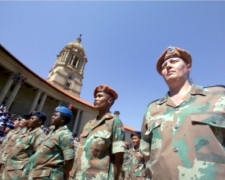
The National Student Financial Aid Scheme (NSFAS) appeared before the Portfolio Committee on Defence to account on how its Higher Education Bursary Programme to Military Veterans’ dependants at higher institutions of learning was faring.
According to the bursary programme overview, NSFAS and the Department of Military Veterans (DMV) signed an open ended Memorandum of Understanding in 2013 to collaborate on funding military veterans’ dependants registered at higher institutions of learning.
“Students who meet the DMV criteria apply to the DMV for funding and it submits the applications of those who are eligible to NSFAS. Then the list gets shared with institutions to confirm registration.”
For the 2017 financial year, NSFAS disbursed more than R82m to well over 1 500 deserving military veteran’s dependants who were enrolled in universities and technical colleges.
NSFAS and the DMV have registered some gains after a lack of coordination which was experienced at the inception of this partnership, said the Senior Manager of Funder Relations, NFSAS, Ms Mpho Matlala.
“We now have an ability to track and monitor the utilisation and distribution of funds to institutions of higher learning at student level. There is now verification of students funding and registration status. And there is an intelligence on institutions study programme costs and progression.”
She though conceded this funding process has its own fair share of challenges. One of which is its transition from manual to computerised claim process as well as the verification of incorrect course codes. As a result of that, well over R5.2m claims remain unpaid.
To mitigate this, NFSAS has set up a servicing team with dedicated individuals to various public institutions, she said. “We have set up joint communication to institutions to deal student payment issues. And we are visiting problematic institutions to resolve issues on the ground. We expect our mop-up campaign to be complete in March 2018.”
This year, this bursary has approved 1 473 students, 352 of which are new and 1 122 are returning students. And the required funding for them is well over R96m, she said.
She said although the recent announcement of fee-free education is expected to lessen the funding burden on the current bursary funders, much needs to be done to update any emerging new data of this bursary to ensure that those above the stipulated threshold of R350 000 are not benefiting from it, she said.
One of the committee members, Mr Shahid Essau, asked now that there is new fee-free education, what will the DMV do to ensure there is compliance? “What is NFSAS’s and the DMV’s stance on this? Will those who are beyond the stipulated threshold be allowed to benefit from this dispensation? What will be your means test and how do you intend resolving this matter?”
The Acting Director-General of the DMV, Mr Max Ozinsky, said that remained a bone of contention because most veterans are averse to any form of a means test even of the fee-free education that has been announced recently. He asked the committee to intervene in this regard. “The issue of the means tests as stated during the proclamation of this policy remains a bone of contention among military veterans. Even those who earn beyond the stipulated R350 000 per annum are of the view that they ought to benefit from the fee-free education. We appeal to the committee to help us to resolve this matter because we are getting no support from the military veterans in this regard.”
But one of the interventions the DMV has suggested is to put in place proper verification of the data base of military veterans. And has enlisted the assistance of the Department of Home Affairs in this regard, he said. “One of the issues we want to ask the Department of Home Affairs to help us with is to verify the information of the dependants of the military veterans. To establish whether they are their actual dependants or not.”
In this coming financial year there are steps we intend to take to verify the information we have on military veterans and to conduct and enforce our means test, he said.
Mr Essau also decried the fact that the DMV seemed to operate outside the policy framework of the R72 000 bursary funding threshold per student. “The current policy does not allow the DMV to fund any student beyond that. Anything beyond that is a deviation from policy,” he insisted.
Mr Ozinsky responded: “We have made such funding deviation in special cases that relate to scarce skills such as engineering and disabled students whose costs are much higher than others. But those are few exceptional cases.”
Responding to Mr Ozinsky’s earlier appeal for the committee’s intervention in resolving the general matter of a means test of the military veterans whether they comply and deserve the monthly grant and other benefits dispensed by the DMV to distressed military veterans or not, the Chairperson of the Committee, Mr Malusi Motimelo, was unequivocal. He said the issue of a means test was a legislative requirement. “I would like to imagine that we must comply with it.”
If the DMV makes such an appeal to us, it means among other things, we would need to amend the current legislation. “If we were to amend the current legislation, you would have to draw the revised guidelines of your means test and we would take it from there.”
By Abel Mputing
7 March 2018

